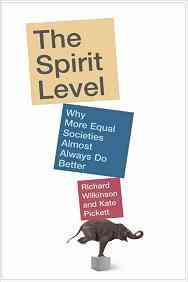Book Review: The Spirit Level: Why more equal societies almost always do better
Article published: Friday, September 4th 2009
“We are intensely relaxed about people getting filthy rich,” business secretary Peter Mandelson once famously declared. For many, this statement summed up the attitude behind New Labour: Ignore inequality; if anything, the poor will benefit if the rich get even richer because some of the wealth will ‘trickle down’.
 In their new book, The Spirit Level, Richard Wilkinson and Kate Pickett essentially say the opposite. They consider inequality the driving force behind most social problems in the developed world: distrust among people, discrimination against women, poor mental and physical health, drug abuse, obesity, poor education, teenage pregnancy, violence, and barriers to moving up the ‘social ladder’. Accordingly, they argue that tackling inequality should be top of the political agenda.
In their new book, The Spirit Level, Richard Wilkinson and Kate Pickett essentially say the opposite. They consider inequality the driving force behind most social problems in the developed world: distrust among people, discrimination against women, poor mental and physical health, drug abuse, obesity, poor education, teenage pregnancy, violence, and barriers to moving up the ‘social ladder’. Accordingly, they argue that tackling inequality should be top of the political agenda.
Wilkinson and Pickett arrive at this conclusion by comparing statistical data from the 23 richest countries in the world. Many will assume that the richer a country is, the fewer the social problems that exist. But the statistics suggest otherwise. The US, for example, is the richest of all countries compared, yet also the one with the gravest social problems. Consequently, Wilkinson and Pickett argue that inequality provides a much better explanation for social problems than wealth.
But what exactly is the link between inequality and social problems? The research suggests that people in unequal societies are likely to be stressed due to intensive competition for status. They worry about how others see them, believing they need to keep up. This constant stress causes physical and mental health problems as well as aggressive and risky behaviour. Moreover, it triggers coping mechanisms like excessive eating or drug abuse.
Wilkinson and Pickett claim that this affects people from all walks of life, not just those at the bottom. They conclude that it is in everyone’s interest to reduce inequality, and call for a ‘transformation’ of contemporary societies. Their main targets are ‘concentrations of power’ in the economy, i.e., large corporations owned and controlled by a few select people. They demand ‘economic democracy’: Privately-owned companies should be turned into co-operatives – they should be owned and controlled by their employees.
The Spirit Level is an important book. Many authors may have criticised contemporary capitalism, but no one has looked systematically at statistics on people’s well-being before. However, Wilkinson and Pickett’s approach has its limitations. They refrain from connecting to any existing political movements, don’t discuss any of the existing left-wing critics of inequality and avoid attacking politicians like Mandelson or Thatcher who have ignored or even condoned rising differences in income. Yet thanks to their research, it has still become easier to pinpoint what is wrong with mainstream politics and, more fundamentally, with societies based on hierarchy and competition.
The writers have launched a website with more information.
Alex Gallas
More: News
Comments
No comments found
The comments are closed.



